

WINTERREISEN II
Kelvin Corcoran & Alan Halsey
2017
At last there was some News from Daddland
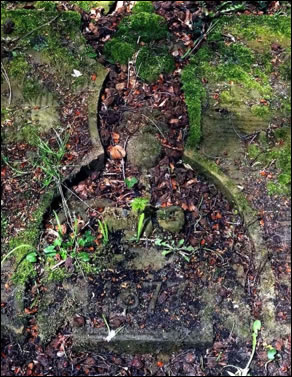
K: The news was not new, it was
rust bloom on the basilica chewing faith,
for all your pretty shape it is
the shitty lid of a manhole cover graced
by grass, a dead-end in thought, Daddland
sucked down the dark tunnel at last.
A: It was the judge’s third case of patricide
in the last six months, unless he dreamed it.
Artists, he’d concluded, are a danger to society,
generally speaking. Because they never doubt
where dreams are concerned. Or because
they think dreams are always concerned.
K: He was having second thoughts, the green
gone purple before his first thought ended,
his faith in transliteration bruised
for a song of the vetches and innocent grass;
jump out of your ditches my bonny fellows
and never dream where doubts are sown.
A: ‘Tell the great Osiris I have done the deed
which is to set him free’ – but then again
‘I didn’t – no gammon – I tell you I shan’t –
only stabbed him once.’ It’s the tense confusion,
mask slipping off focus, remorseless grave bulbs
springing up among the bloated windfalls.
K: Yes, I’ll tell the old boy your news,
though I have a locker-full of limbs,
last time I checked, the requisite number,
dancing the day, though the sun ate my mind,
though my head’s turned backwards, and I think
too long on the preservative qualities of sand.
A: Dazed among daisies, easy as the day
puts horns on his head he comes on like
a feller with stage fright, fraughtest of stags,
sunstruck apple stuck in his gob. Logger beware
he’s sizing you up all ready to lob into the big
bad world where good goblins shouldn’t go.
K: Dazed among daisies, graced on grass
his scampering step timed to a fruit bowl brain,
the chemistry of which is not fully understood;
we people it with demons in a dark wood.
Come out of that, taste candid kind of apple flesh,
the chemistry of Eden made plain as day.
A: As transparent as scripture turned
this way and that until it’s brainless
as a mummy, all mystery sucked out
but scarcely missed. Step on it, scamp,
hurry home to Memphis before time’s up
and you’re flung to the press, heart in ferment.
K: Which is why they’re called Originalists,
to impart a living truth to a foxed document,
a moment in time, hallowed and untouchable.
Yet they aspire to their constitution and spin,
- if there was a history of ideas, we’d be against it.
The words unwrite themselves and a house burns.
A: It was rightly named, that house of correction.
The inmates rush out to watch the doctored files
flaming skyward, nicely massaged accounts,
revised witness statements, waterboard confessions,
gone with the obtuse messages of secret poems
and paintings of the netherworld in obscene detail.
Cracking the code proved impossible
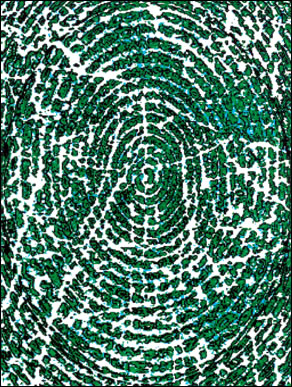
K: I won’t engage with it, the terminology
of codes and decipherment is inadequate,
I got to use words to talk to you,
my big bad thumbprint smack on your forehead
and that giant lurks in etymology,
at least there’s a science to explain all this.
A: I hear you Sweeney crying out loud
in some footnote, wiping your thumbs
on that grease-monkey T-shirt with the
I-was-there motto. Some virtual maze
you brag you invented. You Agonistes
me Janus. Etymology my arse.
K: As it turns out these bones do speak,
etymology my elbow, even beyond Proto-Germanic;
diet, trauma and muscle formation for instance,
a literal life hand-in-glove with the oikumene;
agon - whether you fancy the fight or no,
up now Sweeney - off your tump and at it.
A: And what do we see – can you believe that’s
Sweeney reconfigured as a very early bird
just recently awarded his singular plumage?
But no. He looks more like Lord Tennyson
fresh from the grave with a mouthful of slogans,
an Isle of Wight separatist, a most political poet.
K: Those islanders were wedded to the dead,
their grave dribblings, their sucking mouths,
whilst pedalling in reverse full-tilt into darkness.
From that advantage point they held firm beliefs;
for instance, they made the world revolve backwards
to meet their younger selves on the road to Freshwater.
A: To the white tower they came, the sparkling new Gothic,
the first sight they had of Dimbola Lodge. Here they sat
for Mrs Cameron, for her long exposures in soft focus,
got the fidgets while she fiddled with wet plates. Some
here became King David, Beatrice Cenci, Queen Guinevere.
Note also the distant statue of Mr Hendrix the guitarist.
K: Hendrix took flight all the way from Seattle,
Jimi Jimi, get on the bus and take the wheel
but even singers die – and it’s gratuitous.
I.M. all you like, lacustrine nimbus mourner,
the long home lodge is now a museum and gallery
abandoned in a locked green labyrinth.
A: Probably Lord T didn’t write the reportedly
lost poem beginning ‘All along the watchtower’
but his was a time to search copse and dell for beings
only cameras could see. Ours to unearth hidden faces
in album covers. To forget that photos do lie.
That no snaps are memories but some memories snap.
K: The princes kept the view and sucked up big data,
that history is but the trail of snap snapped memories
we stumble on in the dark wood damp with seasonal rot.
Then to the White Tower we came, the nation’s theme park;
children ride half price into a future, almost allegory,
launched into the night, a social contract revoked.
A: Poor Jean-Jacques, struck off the guest list,
shambles through that wood, out to pick mushrooms
and finding none. Autumn these days, he grumbles,
has also been lost in translation. And whatever happened
to those children? The ghost train came back empty.
That future was a past a wicked quarterwit imagined.
Compared to a late Roman copy
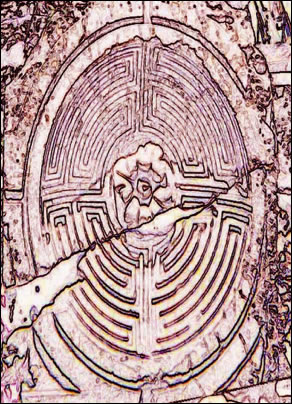
K: It was the goddess Labrys in her labyrinth
everywhere and nowhere to be found,
it’s hard to get your mouth around it;
linguistic drift westward buried her
awash on the shores of Cumae in season
- Oh Labrys, Most Holy, show us the way in/out.
A: What kind fortune some of us
have eyes in the backs of our heads
or else we’d’ve missed the four
sheer white columns of Aphrodite’s temple
towering above that wine-bright sea.
More fizz for everyone around this table.
K: Aphrodite came swanning out of a milky sea,
this was Cyprus and I was young in whiteness
- as for fizz, plenty of that on the waves,
turned to fuzz now, the eyes you see don’t,
their evolution is poor and incomplete;
the temple was buried in a green grove shining.
A: There’s no counting how many drowned
on that crossing, crying prayers to a god
none of our people had heard of or from.
Some point to evidence that Cupid survived
while some rejoice at the mysterious purpose
they’re told Mister Big still keeps up his sleeve.
K: The watery trench between two continents
undid our sailing kind for centuries, that fault
all settled now, no-one drowns for a better life,
riding the subduction zone is peaceful by comparison;
Africa nudges Europe, more than hints a vengeful god,
says we’re a late Roman copy razing Carthage.
A: So we claim that permission, that imposition,
to love Empire to the point of abhorrence.
Those offices, labyrinthine lairs of insurance men,
lawyers, bailiffs and experts in tax evasion
we prefer to forget and forget they reflect
in their flaws and fissures the tenements of saints.
K: Which left me lurking in an ante-chamber
tip-toeing around their hushed adamantine rule,
at the door they know your name and barely nod
settle you sweetly in the ways of abhorrence.
There’s a mechanism for amnesia and its franchise,
we’re contracted to it, a shining city on a hill.
A: Then we all fall down and Hollywood rewrites us.
Here’s your cute squaddie’s skirt, try these leggy sandals:
today you’re a slave who must pretend to revolt.
Just don’t snigger when you see the new emperor,
the halfwitted one with the flyaway thatch, he’s for real.
Remember to say ‘Rome is great again’, silly as it sounds.
K: The tenement of saints is just along the road
favoured by pigeons, a domestic economy
kept off the books, they built no lasting city.
The tenement of saints stands unoccupied,
the insouciance men run it as a populist coup
but accounts don’t record a fake empire.
A: But where else could we buy fake-me shoes?
We wanted felicity but got facility instead.
We heard about massacres that never happened
and so proved our safety. We learnt the perils
of ‘so’ in ‘society’ ‘solecism’ ‘sovereignty’
‘soft’ ‘soap’ ‘soteriology’ and good old ‘sop’.
They’d Overlooked Several Other Clues to the Structure
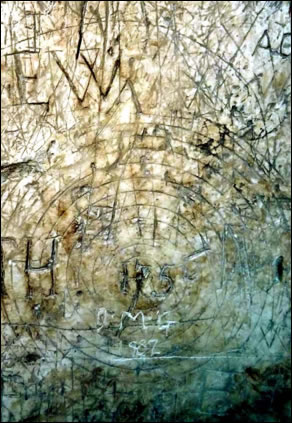
K: I’d say they’d overlooked the whole thing
seeing nothing in another pile of Structuralist voodoo,
another minus zero terminology I can’t abide.
I’d say echo sound location made the picture
and the picture talked first capitals, first inscription
a point of origin incarnate holding the centre.
A: I’ve heard it claimed that the ‘point of origin’
referred to an agent who held the centre with
a 1950s army issue rifle. The Structuralists
filched the idea from a sitcom treatment
of Dante’s Inferno, a long-forgotten flop.
As for echo location a pipistrelle would know.
K: The same old gang of apparatchiks sat on the roof,
rule book and Kalashnikovs to hand, idlers for hire,
dreaming how to fuzz up the image wall, just fat babies
bouncing down Dante’s Funfair helter-skelter
to arrive at the means of production without a clue,
- Is this a spanner or a hermeneutic paradox?
A: It’s likely a sap in an early film noir
ripe for deconstruction. Artfully applied
it k.o.’s the hero, ensuring that the plot
can unfold without him for some untold time.
But the apparatchiks neglect to bring him round
and tell their boss he’s as dead as any author.
K: Roland Barthes jumps out of a cab at The Continental,
he’s here to wash our eyes and rinse the pictures,
dreaming of Jacques Derrida on a tank come to set us free.
But all of this was before the invention of radar,
so what shapes our thought about it, forwards and backwards,
traces to a living source unknown I’ve only heard in song.
A: We hear it still in ‘Who Killed Cock Robin?’
I, said the laundryman. I, said his van.
Who saw him die? I, said the fisheye
they’d fixed to the tank. I, said the ground
as it sank beneath him. Who heard his last words?
I, said the bleep radar hears in its sleep.
K: The digital reduction of that stream
suggests a sort of music, though not dance hall.
So we stood around him, attendant and clueless,
to see the read-out slow slow, bleep a stop;
no-one stepped forward to assume his place,
time will deal with that, said the consultant.
A: Wise words. All the faculty members
attending this prebreakfast symposium
claim they are the rightful heirs although
with due respect as politicians say
they beg to differ. Okay beg. Okay differ.
Just show me the way to the canteen.
K: Just show me the way to go home,
the way to the garden and a beer, thank you.
Surround me with banks of waving digitalis,
steady my heart and let me hear their tiny bells ringing.
Show me the silver lights of the glowing circuit
and let me know it for the first time.
A: Meanwhile back at the symposium
they’re busy listing films to be shown
in Plato’s Cave. Either I’m dreaming or
your head’s spinning round. Now So-&-so’s
unravelling the ins & outs of Yeats’s
widening gyres and now we know we know.
They Set Out …
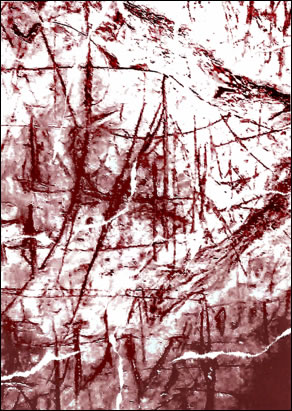
K: They set out for the Pole the next morning
the fur of their parka hoods curtains of ice,
- Hup hup, said Roald, making music of the air
and the dogs bounding to the source of chill,
to magnetic north of exact degree, our bones, I said
I was freezing when I was a head.
A: I sometimes thought that when I was a head
I was had. That bastard who tried to tear
up the photos was probably the one who’d
so carelessly entangled the rigging. Luckily
he hanged himself – ‘inadvertently’ we said and
pressed on. In those days there seemed no bounds.
K: His word objects dropped from the air
taking their form from the sound at last
to imprint themselves on the hidden ground.
Hup Hup, said the Alan, setting out afresh
and the powdered snow raised their shape
into the blue zero of our boundless days.
A: I did as I was told, set those brittle twigs
in the ice in clumsy remembrance of our 3-master.
We still trusted their promise of a rescue party –
people who would not mistake VV for W
or, much worse, M. Is memory really
a red filter? Not dear old sepia or cyan tone?
K: Ah that’s poets talking to poets, the live and the dead
yammer yammer in those empty crowded crevasses,
up there that slow dance red blotch a fool’s fire
and we see the underside of their big word HELP
it opens its empty mouth at the empty sky
our footprints eaten as red signal memory falls away.
A: ‘And’ – as the words come back – ‘sinks in its traces’
which base camp took to mean we dug out of the crevasse
smashed china, cups, plates and shards of fine glass,
a treasure to some and evidence at last of the dwellings
in that most happy land. O Ta Neter! O Hyperborea! O Sumeru!
O and more fools they, gulled yet again by ordinary language.
K: And what they found can finally be explained;
a wealth of evidence poured into her lap,
the objects of a language to hand newly made,
stone-tools, blades, cups and tiny goddesses,
the Arctic as the last thought of the G-d leaving
- and look, that’s a ship amidst the bergs and fog.
A: Where the ice is receding and nervous
grubby bears jump newsprung rivers. Looks like
there’s been a gamma ray burst not so many
light years away and there’s iron-60 just
below ground level. Then they start to bicker
about words and names and territorial rights.
K: You could surely build an empire on this lot,
silvery white cerium, scandium and chutzpah
and that neodymium in your ear speaks my voice.
Prices are indicative in our warehouses in Rotterdam
and there’s no dispute over rights, see this whiphand;
they fell from the sky for us to build an empire.
A: Landed on earth with a bundle of handbooks
to ensure the jargon would be understood.
Look here’s a whole bloody library all yours
if you don’t mind soggy paper. The books float
down the gullies past the nonplussed bears,
pages flip in the current then slowly detach.
Alan Halsey & Kelvin Corcoran have staved off recent winters writing collaborative sequences, beginning with A Horse That Runs: To & Fro with Wallace Stevens, published by Constitutional Information in 2015. Winterreisen I (2015) consisted of four sequences, three of which have appeared in the online magazines Molly Bloom and Intercapillary Space. Perhaps winter 2017-18 will yield a Winterreisen III. Halsey’s Selected Poems 1988-2016 and Corcoran’s Facing West were both published by Shearsman in 2017.